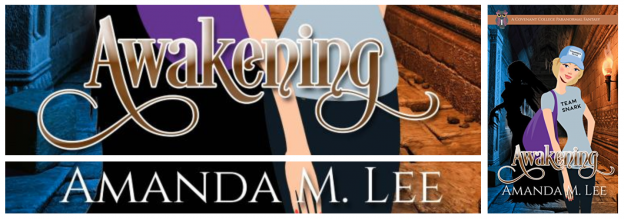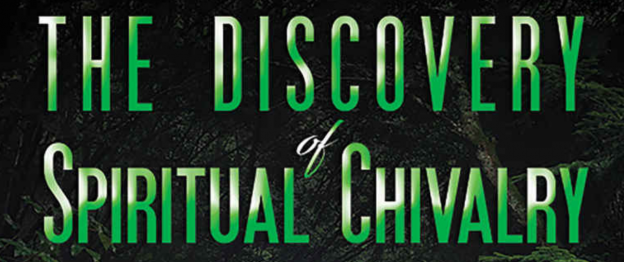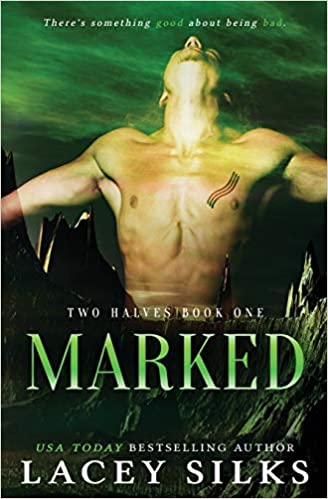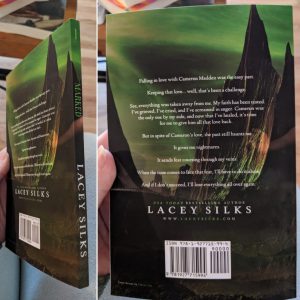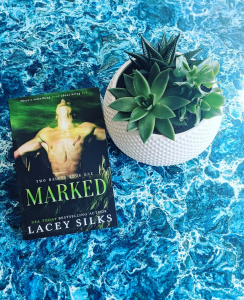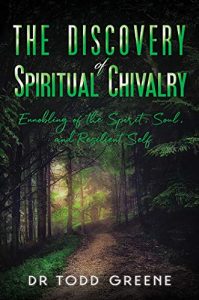
This isn’t a review, per se, so much as a discussion of my experience with the book The Discovery of Spiritual Chivalry, by Dr Todd Greene. As such, it’s rambly, with a bit of a stream-of-consciousness effect.
There is a whole loosely related story of how I ended up with this book and why, despite not generally reading religious books, I chose to read this one. It all started when I received an unsolicited copy of in the mail with the below note.
Normally, I would have done just as asked and put it directly in the LFL and forgotten about it. (Though there is no one more visible place than any other in my LFL. It would be lined up, spine out, like all the others.) But I have to admit I harrumphed at the wording of the note. And since I’m stuck in quarantine with no one to really show it to, I wrote an Instagram post basically saying I thought it was a little dictatorial. I don’t particularly like being told what to do, even when it’s phrased as a request.
Then, I thought to share it in the LFL stewards group (without the book details). It generated an interesting discussion, with about half the responders being like, “Yep, that reads like, ‘Here’s a free gift you didn’t ask for, now do what I want with it.” And the rest being like, “Why on earth would you be mad at that?” (No matter that I said repeatedly that I wasn’t mad, just making an observation.)
Several people pointed out that the note includes both please and thank you, therefore can’t be anything but polite, which honestly made me laugh. Having grown up in and out of the American South, some of the most devastatingly cutting remarks every made to my face have been bracketed in please and thank you.
Later that afternoon, I went on a dog walk with my husband, and we ended up discussing how what really struck me about the thread in the LFL group was a parallel between my experience in the group and that of the note-writer. Both of our comments were being read and judged by others as having a tone and intent probably not intended. I know plenty of the people in a group of ~15,000 just told me to get over myself; there’s nothing wrong with the note. One even asked if I was in a bad mood and if that was maybe why I was reading it the way I was. And I acknowledged from the start that, while I disliked the tone of the note, the author probably didn’t actually mean it to come across as if dictated from a position of authority.
In the end, because it had generated two interesting discussions (the one in the LFL group and then the one with my husband about the experience in the LFL group) and because it is short, I decided to give it a quick read. (Honestly, that quick read became a chapter every few days. So, maybe not as quick as expected.) What’s more, in the course of reading it, I was prompted to further interesting discussions about the actual book and its content with my both my husband and mother. So, while well outside my normal reading lane and not wholly persuasive, in my opinion, I found worth in it.
But reading it was a journey, and it began badly, which is reflected in my somewhat ranty review. The book starts with too many comments like this: “I have heard many people voice that chivalry, in the twenty-first century US, is dead. Being old enough to have known the WWII generation, I agree that chivalrous behavior and norms have substantially declined.”
I was confounded because, during the WWII generation, they had Segregation and Jim Crow, the Klan still rode openly. Hell, if you’re from the South like me, they still marched in the Fourth of July Parade. That’s not chivalry! When large swaths of the population are kept silent and ‘polite’ through terror, that’s not chivalry. And when a member of the most privileged group to exist in that time says that because he didn’t see discord, it didn’t exist, all credibility is shot. Right there on page 13. What he seems to mean is, “I’m old enough to remember when I didn’t have to SEE the rude response to my own ignorance.”
I’ll grant that according to his definition of chivalry people can behave chivalrously while society isn’t. But it is PEOPLE who upheld those same social institutions. So, I have a hard time agreeing that the WWII generation was so much more chivalrous (even by his own definition) than the Millennials simply because they endured the Depression and sacrificed for a war, while also oppressing large portions of the populations.
He then goes on to give an example on page 28 that I found particularly illuminating. I thought it clearly highlighted his inability to see some circumstances from any but his own position and, therefore, might not be as qualified as he seems to think himself to become the self-appointed spiritual guide to the younger generation. This discussion is a little lengthy, but it stood out above everything else in the book to me. I’ll quote it.
Last semester, though I spoke on chivalry for the first time. I did not wake up with that intention but the day prompted it. A blizzard drifted snow across campus the night before. Morning classes were cancelled. While plodding through waist-high drifts to teach my afternoon course, I noticed a female student standing stationary in a snowdrift. She seemed to be stuck there. One step at a time, I made my way over to her, Being in my 50s, and having already walked far, I arrived a little out of breath, I asked if I could help her. My tie, briefcase, and grey sideburns hinted that I was a professor. She gave me a bizarre and seemingly hostile look, as though I was some kind of deviant. She didn’t reply. I asked her a couple more times. She still wouldn’t speak to me or look me in the eyes. She did pull out her smartphone and started to text someone. Baffled, I turned around and plodded toward my building.
He then went to his class and talked about this encounter. Let me ask the women in the audience, what do you do when confronted with unwanted male attention in public? Do you:
- avoid eye contact
- not respond in fear that it will encourage the behavior and/or may inexplicably anger the man, resulting in violence
- pull out your phone in the hope that looking occupied will give the hint you wish to be left alone
- call or text a friend to let them know you’re in an uncomfortable situation and to be available if you need help
These are the things girls and women are explicitly taught to do. Now, maybe she really was just being rude. But I rather think it’s equally likely that there was a whole second set of codified behaviors being enacted and Dr. Greene was too wrapped up in his own behavioral expectations to recognize them. This didn’t stop him from following her script though.
Again, ladies, what’s the next step for the men in these situation when they aren’t given the response they want? Anger and insults, usually. Example: “Smile little lady, it’s a beautiful day” becomes, “Bitch I was just being nice,” if she walks by without the smile. Dr. Greene may not have called her a bitch. But he went to his classroom and ranted about her, felt so confident in his offense, in fact, that he used it as an example of why his book on chivalry is needed by the younger generations. Claimed that the positive response from his students encouraged this idea. (Though I’d have to ask how many of those students so eagerly agreeing with him that this female student who may have found herself feeling stuck and vulnerable and then approached by an unknown man, even one identifiable as a professor, were also male.)
Instead, I saw it as further evidence that he doesn’t truly understand the very people he’s taken it on himself to mansplain chivalry too. He’s quite explicit that he wrote the book for the Millennials and Gen-Zs. Plus, he seemed to conflate social chivalry with spiritual chivalry. By his own definition, they aren’t interchangeable. Being polite and fawning doesn’t seem necessary to progress on one’s spiritual, heroic journey and reach states of chivalry. He especially can’t make this claim if he is willing to excuse the racism of the WWII generation while claiming them so much more noble-spirited and chivalrous.
He even says, “What did bother me, though, was that she didn’t have the basic courtesy to answer me one way or another–let alone thank me for offering help.” He took it on himself to take an unsolicited course of action, placing expectations on her response, and then was bothered when she didn’t respond in the way he wanted. That’s on him, seems to me she was being pretty clear she didn’t wish his attention, so why thank him? Ladies, how many times have we lived this experience?
As an aside, it was also very much like the note included in the book when he sent it to me. I’ve taken it on myself to send you this book that you didn’t ask for. You should be so grateful that you’ll do what I tell you with it. The and you’re being ungrateful and rude if you bristle at my expectations on your time, after all, I said please and thank you is implied. It’s that same sense of expectation and entitlement.
My very strong sense, in the beginning, was that Greene may understand the generational statistics, but, in the same way, it doesn’t seem to have occurred to him that the female student in the snow may tell an entirely different story of meeting him in the quad that day, he seems incapable to separating himself from his own lived experiences to avoid judging them according to his own generation’s standards and expectations. To use the new vernacular, there was a very strong “OK Boomer” vibe going on. And as a Gen Xer—mostly left out of the discussion as normal—I felt appalled on the younger generations’ behalf.
But I’ll admit some of this faded as the book progressed and became focused more on making his argument than convincing the reader it’s needed. When Greene brought up research on homelessness and resilience, Internal Family Systems—really anything data-driven—he had some interesting things to say. These sections were, without fail, well-written, edited, and thought out. I sense he’s probably a very good academic writer.
And if this had been a book on character development or even just the development of spiritual chivalry I’d call it a success. But Green had a secondary goal…or rather, it’s the primary goal, but slipped in as if it unquestionably belongs.
There were so many chapters where Greene was discussing important and interesting aspects of the human condition and I’d think, “Well, that makes sense.” Then he’d essentially tack on “and Q.E.D God.” And I’d blink in confusion. Building character, going on hero’s journeys, healing traumas, absorbing personality exiles, etc., they’re all internal processes. They’re internal and integral to a person. God is external, and I never could follow the step from ‘do all this internal work’ to ‘and you must have this external relationship.’ I just sat there and went, “Why?” Even his explanations left me unconvinced the same accomplishments couldn’t be achieved without God. (Of course, Greene’s argument is that they can’t. So, that’s a fundamental difference that probably can’t be breached at this point.)
I discussed this book with my mother, who is a devout Catholic (though she didn’t come to religion until after I was an adult), and she could follow that step seamlessly. So, I strongly suspect that this is one of those, ‘if you already believe’ it’ll make sense scenarios. But as an apathist, I was not convinced or converted. I felt it the weak link of the book. Rather, I felt it weakened what could have been a stronger book without it. But as I also feel it was the primary purpose of the book—“teaching people that they need God to truly succeed on their Hero’s journey and reach the pinnacle of spiritual chivalry”—what the book could be without it is a moot point.



